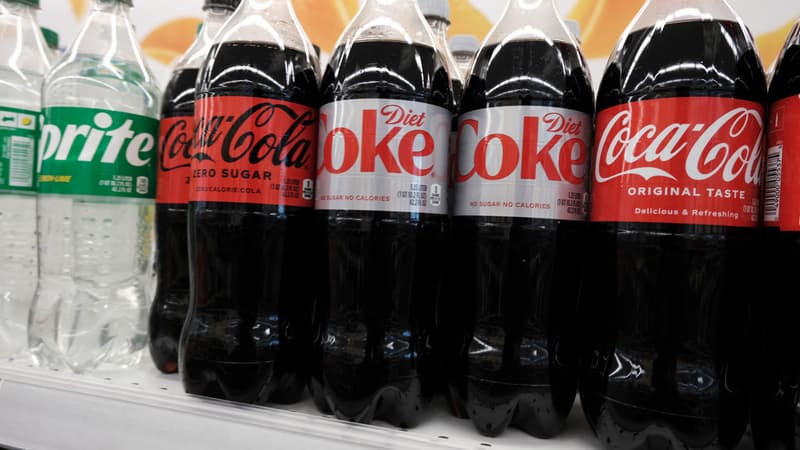The theme is divided and consumers are a bit lost. This Tuesday, February 4, in a common petition, the NGO Food Watch, the French Association League against Cancer and the application of French Nutrition Yuka requires for the European Union authorities to banish aspartamo.
Present, according to Foodwatch, in more than 6,000 products and especially in those most light calls such as some soda without sugars, 0% of yogurts or chewing rubber, this sweetener has been authorized since 1988 in France and excites the debates about the risks that it has on health.
In recent years, opinions and scientific studies have communicated divergent conclusions, some relativating their danger, others highlight it. “Since it is not demonstrated today that Aspartamo is safe for health, it should no longer be authorized in the European market,” organizations said Tuesday.
According to Philippe Bergerot, president of the Cancer League, cited in the joint press release, “there is no reason to allow people to be exposed to the risk of cancer completely avoidable.”
Additional work always necessary
In the opinions published in 2013 and then updated in 2023, the European Food Security Authority (EFSA) had put the danger of the product in perspective, even concluding its safety. According to Foodwatch, Yuka and the National Cancer League, these reports “have been subject to several criticisms of their conflicts of interest” and, therefore, their conclusions are at least questionable.
Its French equivalence, ANSE, indicates more cautiously than no study demonstrates a greater risk of cancer, but underlines “the need to carry out new jobs.” “Anses believes that there is no convincing element to encourage, within the framework of a public health policy, the replacement of sugars with intense sweeteners,” the agency also writes.
In 2022, a French study of INSerm researchers published in Plos Medecine magazine realizes the debate by observing “links with the risk of cancer, as well as cardiovascular diabetes and type 2 diabetes,” explains to BFMTV.com Mathilde Touvier , main author of the study of the study of the study and research director at INSERM. She recognizes that we can “still consolidate” the conclusions and “that no methodology is perfect.”
Who “perhaps” carcinogenic
In 2023, after a long evaluation, the International Center for Cancer Research (Circ) of the World Health Organization (WHO) placed Aspartamo in the group “2b” of its classification, that is, doubted that the sweetener is ” Perhaps “perhaps” carcinogenic.
“It does not mean that it is proven or even probable: that means that we cannot exclude it in the current state of knowledge,” explains BFMTV.com Boris Hansel, Diabetologist and Nutrition Master at the AP-HP, author of the book Eat the light spirit. He specifies that coffee had also been classified as “2b” for a while.
However, for Mathilde Touvier, this classification is “an advance” made with an “accumulation of scientific evidence” and does not testify an absence of evidence.
However, the CIR did not consider modifying the permissible daily dose, established in 1981, 40 mg per kilogram of body weight, for “risk -free” consumption. This corresponds to 9 to 14 “light” soda carnations for an adult that weighs 70 kg, without any other aspartame contribution of other food sources.
“However, in studies, there is an increase in the risk observed in the levels of consumption of a can and a half can,” says Mathilde Touvier.
The Cira called to “clarify the situation more”, pointing out a lack of consolidated information on the subject. However, it does not advise companies to withdraw their products or people to stop their consumption completely.
“Caution Principle”
Therefore, the consumer is not really advanced. According to Vanessa Bedjaï-Haddad, dietitian-nutritionist, avoiding aspartamo is a “precautionary measure.”
However, Boris Hansel believes that “the level of evidence of the risk of cancer is close to zero”, as well as other potential pathologies such as cardiovascular disease.
However, remember that Aspartamo, such as the other sweeteners, has no proven effect on weight loss or diabetes prevention. Aspartamo is generally used for this purpose to replace sugar because if it is also caloric, its sweet power is 200 times and, therefore, the necessary dose is much less important.
For Mathilde Touvier, this lack of efficiency and benefits provided by the consumption of Aspartamo emphasizes that it is not necessary to take risks and avoid it. “This is the precautionary principle,” she abounds.
A “nutritional load”
For Boris Hansel, the risk is to oppose aspartamo and natural sugar, which suggests that the second is better. “Everything depends with which we replace a sweetened drink, if it is water, it is good, if it is a fruit juice or a sweet soda, it is not,” he says. According to him, therefore, he must choose, he prefers the sugar reign product.
“We have more elements about sugar, we know that we must drastically reduce consumption, especially among young people,” he adds, specifying that we should not encourage the consumption of sweetened drinks. “You have to reduce sugar and ultra transformed products,” he summarizes.
A conclusion shared by Mathilde Touvier, which recalls the harmful effects “with a high level of evidence” of excessive sugar consumption: weight gain, heart disorders, dental cavities, etc.
Boris Hansel deplora The “Nutritional Mental Position” imposed on the French by launching such alerts around the aspartamo.
“It is that it causes anxiety and has consequences for the behavior of people who run the risk of resorting to sugary drinks again,” he said.
According to specialists, you must learn again to eat less sweet and favor a “more traditional”, balanced and less transformed diet. “You have to eat more fruits, vegetables, legumes and oleaginous and tender seeds towards a diet called ‘Mediterranean’, that is consensual,” concludes Boris Hansel.
Source: BFM TV


